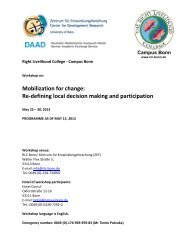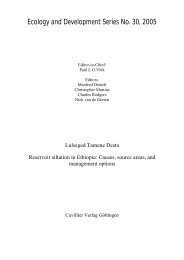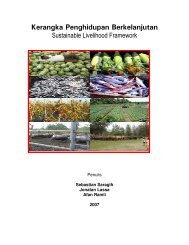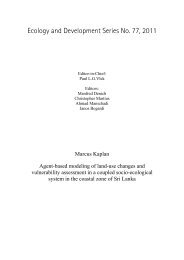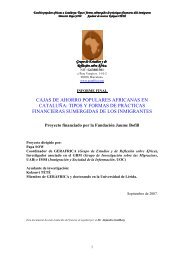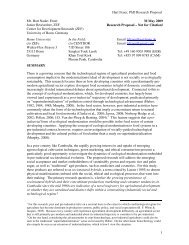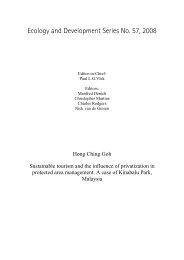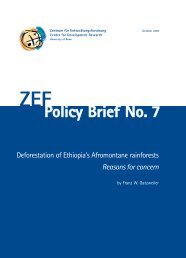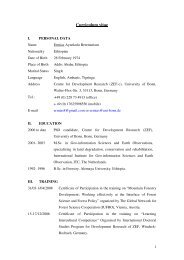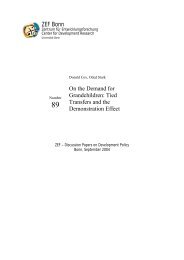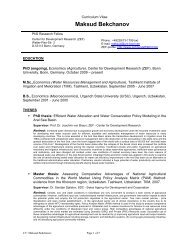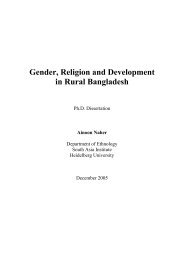Good and Bad Practices in Microinsurance<strong>Karuna</strong> <strong>Trust</strong>, Indiamillion). An application for reinsurance registration will be considered only upon deposit of apaid-up equity capital of two billion Rupees (about $45 million). Valuation of assets andliabilities is prescribed by IRDA.The following deposits (additional to the paid up equity capital required for registration) mustbe held with the Reserve Bank of India (RBI) in cash and/or approved securities (RBIdetermines the market value of securities deposited under this Act):• Life insurance: 1% of total gross premium written, not exceeding Rs. 100,000,000 ($2.3million);• General insurance: 3% of total gross premium written, not exceeding Rs. 100,000,000($2.3 million)• Reinsurance: Rs. 200,000,000 ($4.5 million)Every insurer must have, in excess of liabilities over assets, a required solvency margin,defined as follows:• Life insurers: Rs. 500,000,000 ($11 million) or a function of reserves and reinsurance (fordetails see Act).• General insurance: the highest of Rs. 500,000,000 ($11 million), or 20% of net premiumincome, or 30% of net incurred claims.• Reinsurance: Rs. 1 billion ($22.7 million)IRDA may direct that the lower of the above-mentioned values may apply in case of anunfavourable claim experience, or because of a sharp increase in business volume, or for anyother reason.Reporting. Every insurer must submit a balance sheet, profit-and-loss account, revenueaccount, and profit-and-loss appropriation account on an annual basis in formats prescribedby IRDA. Every insurer shall keep separate accounts related to funds of shareholders andpolicyholders.Auditing. An external auditor must audit the accounts of every insurer annually. For lifeinsurance, an actuarial report is compulsory annually and follows a standardized format withstatements of the internal principal officer that the assured rates, terms and conditions areactuarially sound.Provident SocietiesOnly public companies or registered cooperative societies can offer insurance as providentsocieties. They are eligible to insure birth, marriage or death (other conditions prescribed bysection 65 of the Insurance Act) with a benefit of an annuity payment of maximum Rs. 100($2.30), payable for an uncertain period, or a gross sum of maximum Rs. 1,000 ($23) (allpolicies for one person are considered one policy for all contingencies mentioned).Registration is compulsory in a format prescribed by IRDA. The registration fee for annualrenewal does not exceed Rs. 200 ($4.50) and varies with the volume of insurance businesswritten. The operation of provident societies is regulated by IRDA (e.g., in terms of premiumrate, contributions, maximum amount payable to a subscriber or policyholder, mode ofpayment, benefits, renewal, by-laws, and raising additional capital).4
Good and Bad Practices in Microinsurance<strong>Karuna</strong> <strong>Trust</strong>, IndiaWorking capital of a provident society needs to be at least Rs. 5,000 ($114), exclusive ofpaid-up capital deposited at registration, which is another Rs. 5,000 ($114). An annualaddition in the deposit is required of at least one-fifth of premium income (including feesreceived by the society) up to a maximum deposit of Rs. 50,000 ($1136). Deposits are held atRBI, for and on behalf of the central government.Reporting. When more than one class of insurance is offered, separate accounts and fundsmust be held for each class. Registration of annual income and expenses is compulsory, in theformat prescribed. Provident societies must prepare a revenue account and balance sheet withdetails of new policies affected, total premium income received, total amount of claims madeand the expenses. The auditor will then verify this in a prescribed manner. The audit by aninternal and external auditor, as well as by the authority, is annual. An actuarial report iscompulsory once every five years or less when deemed necessary.Mutual Insurance Companies and Cooperative Life Insurance SocietiesA “Mutual Insurance Company” is an insurer, incorporated under the Companies Act 1913(No 7, 1913), with no share capital and whose policyholders are all members. A “CooperativeLife Insurance Society” is a society, acting as life insurer, with no share capital on whichdividend and bonus is payable, registered under the Cooperative Societies Act, 1912, or underan Act of state legislature. Cooperatives are licensed to operate under state regulation thatprevails over the Insurance Act. Other cooperative societies may be approved as members ofa cooperative life insurance society without being eligible for any dividend, profit or bonus.The capital requirements for a mutual company or cooperative society are only Rs. 15,000($340). Deposit for both types of insurers, when operating life insurance: Rs. 200,000($4545) in cash or approved securities (day-value), deposited with RBI (may be ininstalments with an initial deposit of more than Rs. 25,000 ($568) and an annual addition ofmore than one third of premium income).Reporting of the balance sheet and the revenue account has to be submitted with a summaryin a prescribed format. This reporting of cooperatives and mutuals is to State Registrar ofCompanies. This is the State (and not the federal) Registrar under the provisions of Section134 of the Indian Companies Act 1913. Documents may also be furnished to the registrar ofCooperative Societies of the State in which the Cooperative Life Insurance Society isregistered. Auditing is not explicitly mentioned.Institutional OptionsIRDA is aware of the need for and importance of grassroots microinsurance schemes. TheConcept Paper on Need for Developing Micro-Insurance in India (August 18 th , 2004, issuedby IRDA) promotes the partner-agent model when increasing coverage for the ruralpopulation through such schemes. In a recent Round Table with the IRDA in Hyderabad(February 19 th , 2005), other prevalent types of microinsurance models were discussed, aswell as ways to strengthen them. In November 2005, IRDA issued microinsurance regulationfor the partner-agent model. Microinsurance agents (e.g., NGOs) are allowed to tie up withone life and one general insurance company. These companies can partner in thedevelopment of an appropriate microinsurance product. IRDA sets a framework for the5



